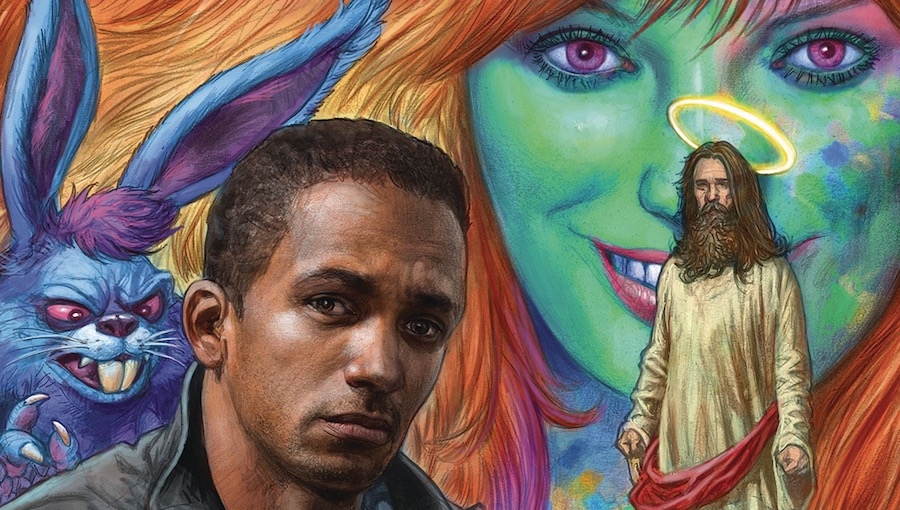My Ainsel #4 is another foray into the deep, dark depths of both America and human nature. I feel as though each month, American Gods takes us into a Gothic dungeon for story time. The stories are typically meant to educate, illuminate, or ruminate on some larger issue, but they do not contain the typical moral lessons you’d find in fairy tales or myths. This is a Gaiman world, and in a Gaiman world, we must expect to be shocked, disturbed, and confused. Lessons may not be obvious or necessarily seem relevant, but they are all part of the anthology of Gaiman’s mythology.
The story that begins My Ainsel #4 sounds like a regular police case: a broken father succumbs to hist vices, divorces his wife, and kidnaps their kid. But Shadow’s dream follows two pages later. Darkness, giant black birds, and human skulls make up the dreamscape, as Shadow tries to navigate and find what he is looking for. The ex-wife from the police officer’s story (who happens to be Shadow’s neighbor) even makes an appearance, blurring the lines between reality and fantasy. I suppose story worlds have no distinct boundary lines in American Gods.
This overlap of reality and fantasy becomes even more apparent when Wednesday calls Shadow to tell him that his dream was like a beacon, disclosing his location to anyone who may be looking for him. If other characters can see Shadow’s dreams, then there truly is no privacy, no escape. An individual has limited control of both the real world and the dreaming world. (This is so reminiscent of Sandman that now I feel like Gaiman worlds are colliding!)
P. Craig Russell brilliantly layers these worlds and stories in each issue so that they seamlessly bleed into one another. Everything simultaneously seems distinct and connected. Shadow continues to be along a topsy turvy ride with no end or resolution in sight. He cannot seem to escape the world of crime, but he also behaves with a moral code and respectability. Shadow is the ideal traveler and helper, because people are drawn to him. He is enticing but doesn’t seem dangerous.
Shadow and Wednesday’s journey continues and brings them to San Francisco where they meet Easter. The dark humor in Easter’s picnic spread leaves me simultaneously cringing and smirking. With all of the winter dreariness of Lakeside, Easter is a refreshing reminder of spring. Scott Hampton’s art clearly shows the seasonal transition (even though it is still January) with the green park. Easter’s blond hair pops out of the page like sunshine, and her colorful floral picnic blanket brings spring flowers into the scene. In David Mack’s stunning and vibrant variant cover, Easter’s hair is made up of an assortment of beautiful flowers. Easter is also an interesting incorporation of Christianity into the mythology of American Gods which is so deeply rooted in Norse mythology.
The issue aptly ends leading Shadow off to a new task—a fresh mystery to challenge him. Meanwhile, we will likely see more of Easter, as Wednesday has cajoled her into joining the team. I’m not sure what she will bring to the table, but in American Gods, there are tricks hiding up everyone’s sleeve.
Creative Team: Neil Gaiman (story and words), P. Craig Russell (script and layouts), Scott Hampton (art)
Publisher: Dark Horse
Click here to purchase.

